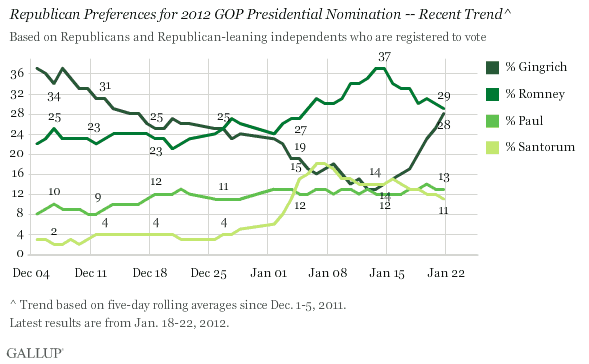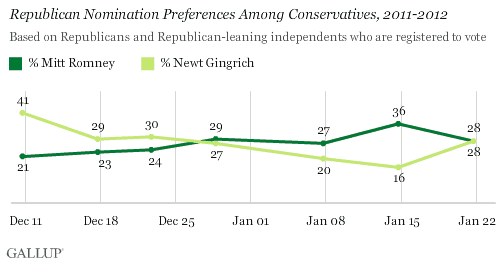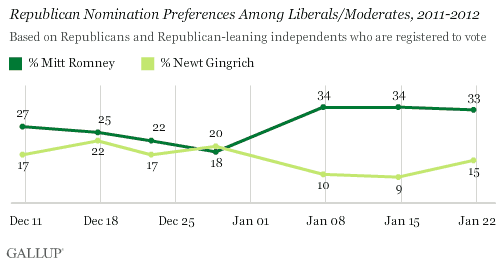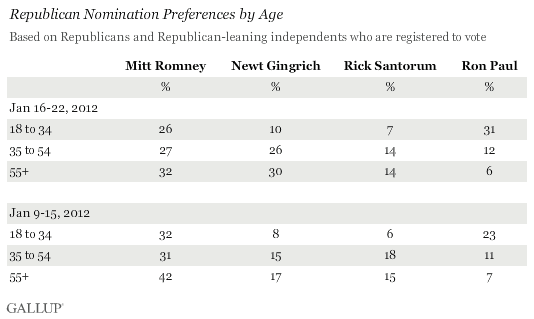PRINCETON, NJ -- Newt Gingrich has all but erased Mitt Romney's 23-percentage-point lead of a week ago among Republican voters nationally, and the two candidates are now essentially tied, at 29% for Romney and 28% for Gingrich. Ron Paul and Rick Santorum have significantly lower levels of support, at 13% and 11%, respectively.

Romney held a 23-point lead over Gingrich as recently as Jan. 11-15. Thus, in a matter of one week, Republicans who are registered to vote have shifted their support substantially -- with Romney dropping 8 points and Gingrich gaining 14 points. The latest Gallup tracking update covers Jan. 18-22, encompassing Gingrich's come-from-behind 12-point victory over Romney in Saturday's South Carolina Republican primary. Gingrich began to gain on Romney well before Saturday's vote, however, most likely reflecting his performance in the two nationally televised debates held in South Carolina last Monday and Thursday.
This shifting of support between Romney and Gingrich is not a new phenomenon. Romney led Gingrich by as much as 19 points among national Republican adults in polling conducted in September, only to see that lead evaporate as Gingrich charged ahead to a 15-point lead over Romney in early December, 37% to 22%. Gingrich's support then fell steadily throughout December and Romney regained support after his near win in Iowa and his strong victory in the New Hampshire primary. Now, once again, Gingrich has surged back.
Paul and Santorum at this point have less than half the support of either Gingrich or Romney; trends at the national level suggest that the GOP contest is settling down into a two-person race.
Gingrich Gaining Most Among Conservatives
Gingrich's gains over the last week have come mostly among conservative Republicans, one of the groups that has been most "in play" throughout the Republican presidential nomination process.
Over the two-week period between Jan. 9-15 and Jan. 16-22, Gingrich's support among conservative Republican registered voters increased from 16% to 28%. Romney's support among conservatives fell between these two weeks, from 36% to 28%. By contrast, Romney's support among moderate and liberal Republicans held constant across these two weeks, while Gingrich gained six points.


Romney lost support across all three age groups over the last week, but lost the most among Republican voters 55 and older. Young adults still show above-average support for Paul.

Gingrich gained significantly more among men over the last two weeks than among women, and now leads Romney by 2 points among men while continuing to trail among women, by 12 points. A week ago, Romney led by substantial margins among both groups.
Gingrich also gained more in the South than in any other region. Complete trends by subgroup are available here.
Implications
Gingrich and Romney continue to exchange the lead in the race for the Republican presidential nomination, not unlike the final quarter of a close championship football game. The most obvious implication of this back and forth is Romney's failure to consolidate and sustain his support among Republicans nationally. The virtual evaporation of Romney's 20-plus-point lead over the last week suggests that Republicans most certainly have not settled on the former Massachusetts governor as their final choice for the nominee. The fact that Gingrich has managed to resurrect his standing in the polls once again suggests that Republicans have most certainly not ruled him out.
Whether Gingrich will eventually regain the type of significant lead he held in early December remains to be seen. Attention has shifted to the Jan. 31 Florida primary, with two scheduled debates in the Sunshine State Monday and Thursday of this week. President Obama's State of the Union address on Tuesday night may also have some indirect impact on how Republicans view the field of nominees vying to oppose Obama next November.
The frequent nationally televised debates have been a major factor in this race so far. Gingrich's aggressive performances and ability to articulate policy positions at length have almost certainly benefited him. Gallup research conducted in December found that Republicans nationally said Gingrich had done the best job in the debates through that point. Romney's inability to respond forcefully to questions about his tenure at Bain Capital and his decision-making process concerning his tax returns have almost certainly weakened his position.
The Romney team is aware of all of this, of course, and the most interesting development of the week promises to be the way in which Romney handles himself during the two Florida debates. Romney's debate performance and his decision to release his 2010 tax return on Tuesday in theory could help him regain lost ground. On the other hand, a less-than-stellar performance in the debates and a negative reaction to his tax return could hurt him.
Survey Methods
Results are based on telephone interviews conducted as part of Gallup Daily tracking Jan. 18-22, 2011, with a random sample of 1,221 Republican registered voters, aged 18 and older, living in all 50 U.S. states and the District of Columbia.
For results based on the total sample of Republicans who are registered to vote, one can say with 95% confidence that the maximum margin of sampling error is ±4 percentage points.
Interviews are conducted with respondents on landline telephones and cellular phones, with interviews conducted in Spanish for respondents who are primarily Spanish-speaking. Each sample includes a minimum quota of 400 cell phone respondents and 600 landline respondents per 1,000 national adults, with additional minimum quotas among landline respondents by region. Landline telephone numbers are chosen at random among listed telephone numbers. Cell phone numbers are selected using random-digit-dial methods. Landline respondents are chosen at random within each household on the basis of which member had the most recent birthday.
Samples are weighted by gender, age, race, Hispanic ethnicity, education, region, adults in the household, and phone status (cell phone only/landline only/both, cell phone mostly, and having an unlisted landline number). Demographic weighting targets are based on the March 2011 Current Population Survey figures for the aged 18 and older non-institutionalized population living in U.S. telephone households. All reported margins of sampling error include the computed design effects for weighting and sample design.
In addition to sampling error, question wording and practical difficulties in conducting surveys can introduce error or bias into the findings of public opinion polls.
For more details on Gallup's polling methodology, visit www.gallup.com.
